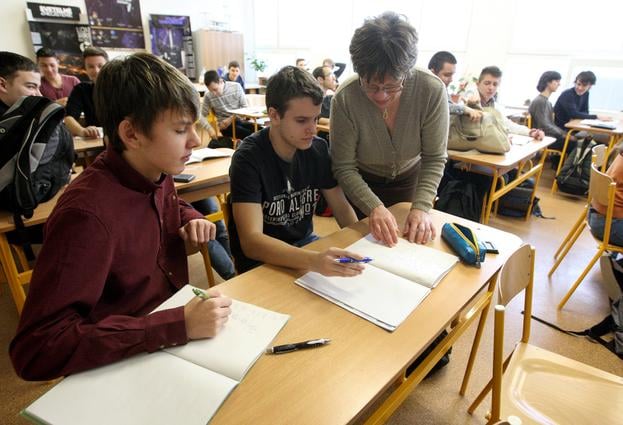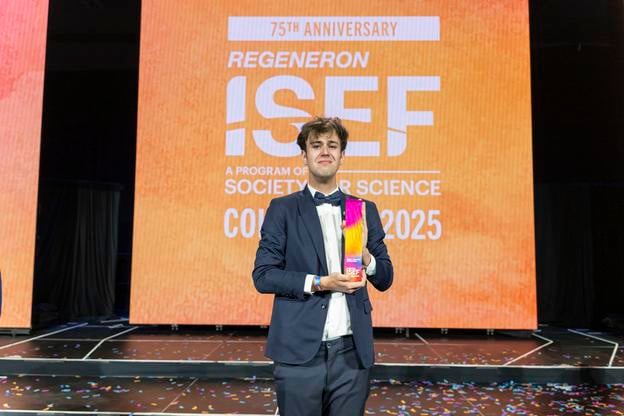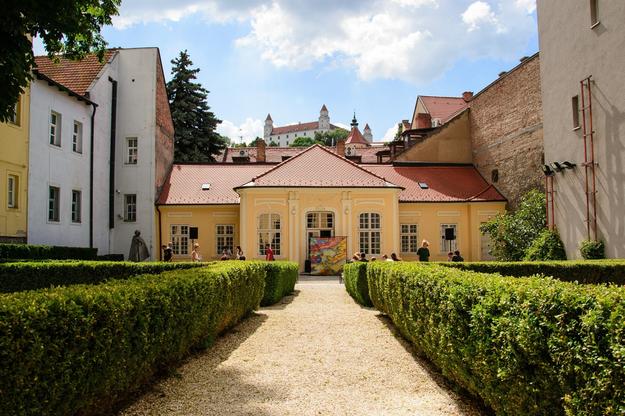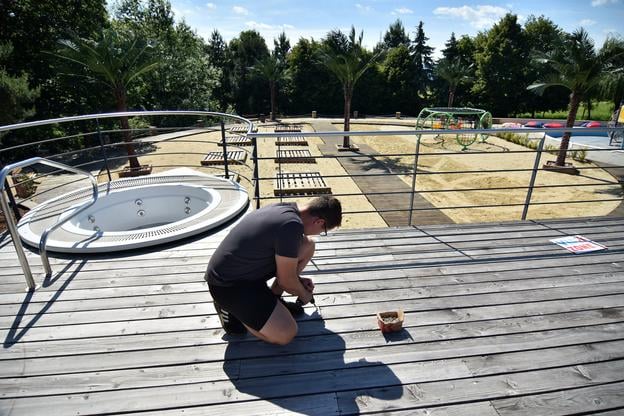Good evening. Here is the Friday, June 6 edition of Today in Slovakia - the main news of the day in less than five minutes.
Teachers to be paid more – but only if they make the grade
In a significant reform of Slovakia’s education system, teachers will be assessed annually using a five-grade scale – mirroring how they themselves evaluate students – and their pay will increasingly depend on these evaluations. The move is part of a government plan to boost teacher motivation and address longstanding criticisms of stagnating pay and lack of performance-based rewards in the school system, the Sme daily reported.
The change, introduced by Education Minister Tomáš Drucker (Hlas), comes alongside a promised 7-percent salary increase from September 2025 and another pay rise in January 2026.
From January 2026, all primary and secondary school teachers will receive a modest flat-rate bonus regardless of evaluation. But from September 2027, only those rated "excellent" or "very good" will qualify for performance-based bonuses. A starting teacher with a base salary of €1,305 could earn up to €650 more each month under the new scheme.
Who will evaluate teachers?
Principals will evaluate teachers annually based on a five-level scale: vynikajúca, veľmi dobrá, štandardná, uspokojivá, neuspokojivá (excellent, very good, standard, satisfactory, unsatisfactory).
Each school will define its own evaluation criteria – the Education Ministry will not impose standardised rules.
The evaluation must be pre-defined in the school’s internal regulations.
"We can’t pretend that all teachers are excellent,” said Eva Horníková, head of a Bratislava primary school and president of the Association of Primary Schools. “We cannot reward everyone equally, as the unions demand.”
The reform is meant to respond to concerns that Slovakia’s education system is too egalitarian in pay, providing no incentives for better performance. Schools will be given freedom to set their own evaluation criteria, though unions worry this will open the door to favouritism and lack of transparency.
“This gives too much power to principals to reward only a few,” said union leader Pavel Ondek, arguing that higher base pay would be a more equitable solution. Critics also fear that bonuses could be handed out based on personal relationships rather than merit. “Every system can be abused,” Horníková acknowledged, though she still called the reform “a powerful management tool.”
The government has allocated €132.5 million for the new bonus scheme in 2026. The school inspection service will be tasked with ensuring fair implementation.
The reform reflects broader efforts to retain teachers amid regional pay disparities and an ongoing teacher shortage, particularly in urban areas like Bratislava and Košice. Analysts say the new system could improve motivation – but only if implemented transparently and fairly.
MORE STORIES FROM THE SLOVAK SPECTATOR WEBSITE
Weekend: From silent air shows and mediaeval festivals to theatre in Nitra and a children’s folklore parade in Bratislava, this weekend in Slovakia is packed with unique events for all ages and tastes. Discover where to go and what not to miss.
Warmer street lights: Bratislava is replacing its harsh white streetlights with warmer, softer lighting to improve sleep, protect wildlife, and reduce light pollution.
Volunteering: Over 7,700 volunteers from 188 companies have spent today, Friday, June 6, restoring schools, parks and heritage sites across Slovakia as part of the country’s largest corporate volunteering event, Naše Mesto.
Music: They made it to Glastonbury once. Now they’re going back for more.
If you like what we are doing and want to support good journalism, please consider buying our online subscription with no ads. We'll mail a copy of The Slovak Spectator's monthly print edition to your home in Slovakia. Thank you!
FEATURE STORY
Slovak teen wins $100,000 for breakthrough in antiviral drug research
Nineteen-year-old Slovak teenager Adam Kovalčík from Dulovce emerged ahead of over 1,600 students worldwide to win the top prize at the world’s largest science fair – the Regeneron International Science and Engineering Fair (ISEF). Using corn husk waste, he made a key antiviral drug cheaper, faster to produce, and even more effective. Read on to learn more, and to discover our other feel-good stories, designed to brighten your day.
EVENT FOR THE WEEKEND
Bratislava’s parks and gardens are waiting for you
From June 6–8, Bratislava joins over 500 parks and gardens in 23 European countries for the Open Parks and Gardens Weekend. This year’s theme, Stone in the Garden, highlights the beauty and purpose of stone in garden design. Public and private gardens – some normally closed to visitors – will open their gates, offering a rare chance to discover hidden green spaces across the city. Click here to learn more about this free event and explore the map of participating gardens – and also discover two other free things to do this weekend.
IN OTHER NEWS
Róbert Švec, the organiser of a petition calling for a referendum to end sanctions on Russia, is facing allegations of signature forgery, as his petition sheets contain approximately 10,000 unverified signatures from residents of Brezno. That would represent 76 percent of the town’s entire adult population. President Peter Pellegrini refused to announce the referendum after receiving the petition, stating that it did not meet legal requirements and highlighting the possibility of manipulation, including repeated names and fictitious signatures. Švec accused his critics of trying to discredit the initiative and declined to comment on the allegations, citing the president’s lack of authority to verify the authenticity of the signatures. (Sme)
Restaurants in Slovakia’s High Tatras have begun serving dishes containing bear meat sourced from legally culled animals, with some restaurateurs reporting consistent demand. The initiative, supported by the Environment Ministry, aims to foster "national unity" – or what State Secretary Filip Kuffa called “bonding over a good meal”. However, not everyone is on board. Several hoteliers remain cautious or are openly refusing to serve bear meat, fearing it may upset guests. The Tatra National Park authority confirmed that over ten bears have been culled in their jurisdiction and are being processed for certified consumption. (tvnoviny.sk)
Eastern Slovakia’s Domaša reservoir is less than half full, leaving a cruise boat stranded and dry lakebeds overgrown with weeds. “This year’s season is probably lost,” said Michal Flešár, mayor of Holčíkovce, one of the villages that borders the reservoir, which is one of the biggest bodies of water in Slovakia. Officials blame miscommunication over water management changes after a local wood-processing factory shut down. While the Environment Department in Prešov says it acted when formally requested, water authorities argue it could have intervened sooner. Water flow into the Ondava River will be slightly reduced from July 1, but local mayors say it’s too late to save the summer. Meanwhile, the government approved a major sewerage project for 18 surrounding villages, reaffirming Domaša’s future role as a backup source of drinking water. (TVnoviny.sk)
President Peter Pellegrini has appointed nuclear physicist Martin Venhart as the new president of the Slovak Academy of Sciences (SAV), replacing Pavol Šajgalík. Venhart begins his four-year term with a focus on restoring public trust in science and strengthening top-level research. A renowned expert in nuclear physics, Venhart led Slovakia's first experiment at CERN and has held leadership roles at SAV since 2017. (TASR)
A defence lawyer representing former justice minister Gábor Gál has called for his acquittal on bribery charges, arguing that the alleged offence was not proven. At the Specialised Criminal Court in Pezinok, lawyer Tomáš Rosina claimed the case relied solely on the testimony of key witness Ján Gajan, and said that testimony from other witnesses contradicted Gajan's. Gál is accused of accepting a €50,000 bribe in 2018 to influence decisions at the Slovak Land Fund. If convicted, he faces up to five years in prison. Charges against a co-defendant, Ladislav K, were dropped as the statute of limitations had been exceeded. (TASR)
WEATHER FOR THE WEEKEND: Slovakia will experience hot and humid weather, with occasional cloud cover and scattered showers, some of which may be intense. Daytime temperatures on Saturday are expected to range from 28°C to 33°C. On Sunday, temperatures in most places will cool slightly, ranging from 18°C to 25°C. However, some southern and eastern regions could still see highs of up to 32°C. The Slovak Hydrometeorological Institute (SHMÚ) has issued a Level 1 heat warning for Banská Bystrica, Nitra and Košice Regions on Saturday. In addition, a Level 1 thunderstorm warning is in effect for Nitra Region. A Level 2 thunderstorm warning has been issued for western and northwestern Slovakia, including Bratislava, Trenčín, Trnava and Žilina Regions. On Sunday, weather warnings will remain in effect and will extend to cover the entire eastern part of the country. (SHMÚ)
WEEKEND PARTY TIME: This weekend, Róbert and Róberta, Medard and — last but not least — Stanislava are marking their name days. Don’t forget to send your best wishes: Róbert and Róberta on Saturday (7 June), Medard on Sunday (8 June), and Stanislava on Monday (9 June).
Thank you for subscribing and reading. It means a lot to us.
P.S. If you have suggestions on how our news overview can be improved, you can reach us at editorial@spectator.sk.
Follow The Slovak Spectator on Facebook, LinkedIn and Instagram(@slovakspectator).


 A 2018 study, TALIS, showed that relatively few young people in Slovakia were interested in becoming teachers. (source: SME, SME- Ján Krošlák)
A 2018 study, TALIS, showed that relatively few young people in Slovakia were interested in becoming teachers. (source: SME, SME- Ján Krošlák)
 Adam Kovalčík won the George D. Yancopoulos Innovator Award at the Regeneron International Science and Engineering Fair. It comes with a $100,000 prize. (source: Society for Science)
Adam Kovalčík won the George D. Yancopoulos Innovator Award at the Regeneron International Science and Engineering Fair. It comes with a $100,000 prize. (source: Society for Science)
 The Liszt Garden in Bratislava (source: Courtesy of National Trust)
The Liszt Garden in Bratislava (source: Courtesy of National Trust)
 Preparations for the opening of the Aqua Playa summer swimming pool in Veľaty, near Trebišov in eastern Slovakia. (source: Roman Hanc)
Preparations for the opening of the Aqua Playa summer swimming pool in Veľaty, near Trebišov in eastern Slovakia. (source: Roman Hanc)